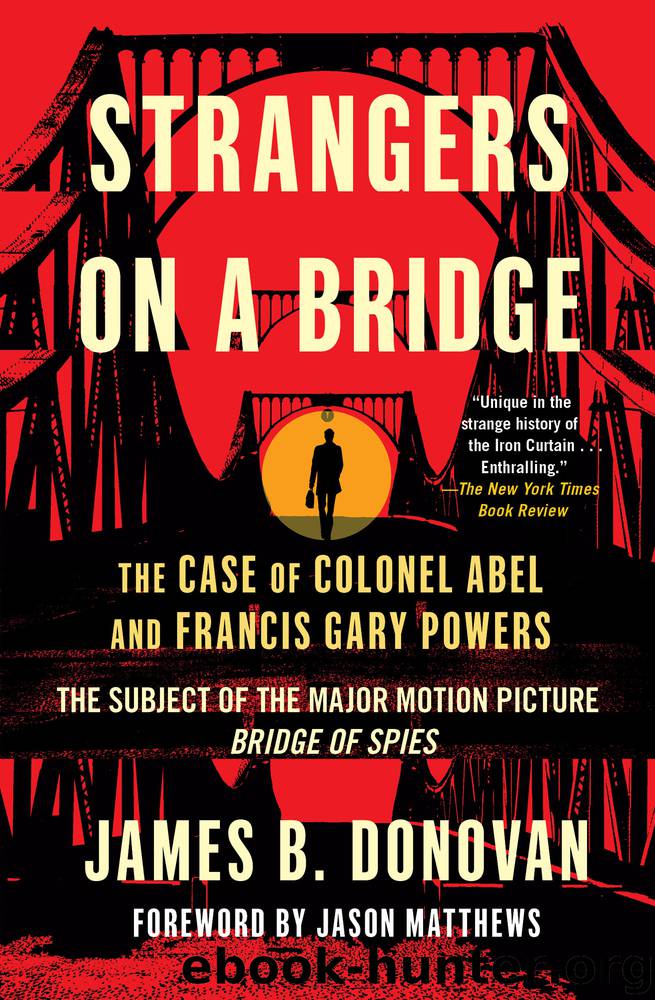Strangers on a Bridge by James Donovan

Author:James Donovan
Language: eng
Format: epub
Publisher: Scribner
Thursday, October 24
The courtroom was crowded and it was a hot day. I was pleased in this case that under the rules I would sum up first. My appeal now would be solely to the jury, so I moved up close before them.
• • •
Donovan: May it please the Court, ladies and gentlemen of the jury.
This trial has been an experience, I know for me and I feel sure for you as well. Like all experiences, they are meaningful when we can look at them with the benefit of hindsight.
You will remember that when this trial commenced, I spoke briefly to you about what was your conscientious duty as a juror. I explained that your duty is to conscientiously determine the facts and find whether or not this man named Abel has been proved guilty by evidence produced in this court, before you, of the specific charges made against him.
I explained to you that this is not a trial of communism, and it is not a trial of Soviet Russia. The issue I have just stated is the sole one before you.
Now, having understood that situation, you and I have been waiting to see what evidence was produced against this man. We have now seen all that evidence; we have seen and heard all the witnesses. We had an opportunity to evaluate them: to see whether or not each one of them was telling the truth; what his motives were on the one hand to tell the truth, or what his motives were on the other hand to try to tell whatever story would be best designed to save his own skin.
It is terribly important in this particular trial that you have a clear concept of the function of the jury in America. We believe that our trial-by-jury system is the best system ever devised for arriving at the truth.
Why is your function so important?
You might say to yourselves, “His Honor, the judge, knows all the law applicable to the case; he has been trained for many years to evaluate evidence. Why, then, shouldn’t cases such as this simply be left to the lawyers and the judges?”
The answer is that from the time of Aristotle many centuries ago, ordinary citizens are not content to leave these questions to the lawyers and judges, with their legalisms and their legal niceties.
In the United States, at the time of the American Revolution, our country was welded together among the intellectuals by a series of papers called “The Federalist,” written by a group of men that included the best legal minds in the nation. But the cause of the American Revolution was best sold to the ordinary people not by “The Federalist,” but by a pamphlet written by a man named Thomas Paine and called “Common Sense.”
All that I am going to ask you to do in this particular case, because of certain legal niceties and so on, is that while you receive your instructions as to the law from the judge, I ask simply that you use common sense in considering this case.
Download
This site does not store any files on its server. We only index and link to content provided by other sites. Please contact the content providers to delete copyright contents if any and email us, we'll remove relevant links or contents immediately.
| Biological & Chemical | Conventional |
| Nuclear |
The Radium Girls by Kate Moore(12033)
100 Deadly Skills by Clint Emerson(4929)
Rise and Kill First by Ronen Bergman(4792)
The Templars by Dan Jones(4690)
The Doomsday Machine by Daniel Ellsberg(4492)
The Rape of Nanking by Iris Chang(4217)
Killing England by Bill O'Reilly(4006)
Stalin by Stephen Kotkin(3970)
Hitler in Los Angeles by Steven J. Ross(3947)
12 Strong by Doug Stanton(3553)
Hitler's Monsters by Eric Kurlander(3344)
Blood and Sand by Alex Von Tunzelmann(3206)
The Code Book by Simon Singh(3193)
Darkest Hour by Anthony McCarten(3134)
The Art of War Visualized by Jessica Hagy(3012)
Hitler's Flying Saucers: A Guide to German Flying Discs of the Second World War by Stevens Henry(2757)
Babylon's Ark by Lawrence Anthony(2683)
The Second World Wars by Victor Davis Hanson(2528)
Tobruk by Peter Fitzsimons(2520)
